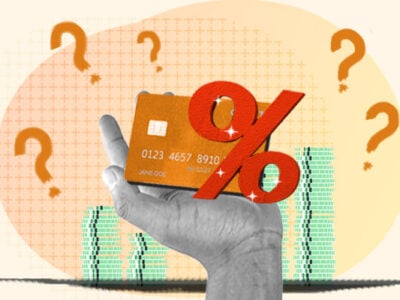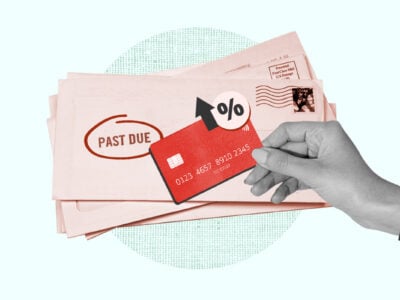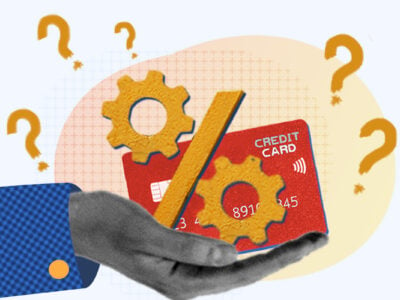The sad reality is that credit card debt is incredibly common. Because credit cards give us a sense of buying power that we may not have, many borrowers find themselves surprised by their monthly credit card bills.
Even worse, credit cards have infamously high interest rates, meaning unpaid balances quickly gain interest charges. This can cause your debt to quickly snowball out of control.
Fortunately, you don’t need to pay interest on your credit card if you use it wisely. You can avoid getting charged interest altogether if you use these 5 techniques.
Table of Contents
1. Pay your balance in full
The easiest way to avoid credit card interest is to pay off your credit card in full each month.
Your credit card’s APR (which stands for “annual percentage rate”) is the annual rate of interest assigned to various card functions (e.g., making purchases, withdrawing cash advances, performing balance transfers, etc). Your credit card’s interest rate on everyday purchases is known as its purchase APR. This is the most common interest rate you’ll be charged on your credit card.
What many people don’t realize is that everyday purchases on your card won’t accrue any interest at all until the first payment due date after you make them. This means that if you pay off all your credit card purchases for each billing cycle in full, you’ll never have to pay interest on your card.
Set up autopay
To make avoiding interest on your credit card easy, set up automatic payments from your bank account to your card so that there’s no chance of you forgetting to pay by the due date. Many credit card issuers have online credit card management platforms that allow you to set up autopay.
Set your autopay amount to “total amount due” or a similar setting that pays your full balance each month. That way, you’ll never have to worry about credit card interest again, as long as you keep enough funds in your bank account to pay off your card.
2. Take advantage of the grace period
Many credit card issuers offer something called a “grace period,” although they’re not required to do so. A credit card grace period is a period of time between your statement closing date and payment due date that allows you to make interest-free purchases (as long as you pay your statement balance in full by the due date).
Grace periods tend to be 21–25 days long, but can be even longer depending on the card issuer. Because your grace period effectively extends your billing cycle, if you make a large purchase right at the beginning of your cycle, the grace period means you’ll have around two months to pay it off before it will begin accruing interest.
Taking advantage of the grace period can be very lucrative. However, if you ever fail to pay off your statement balance by the due date, you’ll lose your grace period, at least temporarily. This is another reason why it’s so important to always pay your balance in full each and every month.
3. Avoid cash advances
Different credit card APRs have different rules. For example, cash advance APRs don’t feature grace periods.
Cash advances are when you take cash out of your credit card at an ATM. While they may seem like a convenient way to get funds beyond what you have in your checking account, cash advances can be incredibly expensive.
Not only do cash advances usually come with additional fees, but the cash advance APR on your card will also probably be higher than its purchase APR. That coupled with the previously mentioned lack of a grace period means your cash advance will start accumulating interest right away at a high rate.
Unless you’re in a desperate situation, avoid cash advances and the interest they incur.
4. Get a 0% APR credit card
If you have large expenses coming up and are worried about the interest they may bring, consider applying for a 0% APR credit card to avoid interest entirely for a set period of time.
0% APR credit cards offer introductory no-interest periods, usually 6–18 months long. However, 0% APR offers can last as long as 24 months, depending on the card issuer.
To get one of these cards, you’ll need a good credit score. If you can land one, you can make purchases on the card without accruing any interest during the introductory period.
However, once the offer period expires, you’ll begin getting charged interest on any remaining balance at the regular interest rate.
Consolidate credit card debt to avoid interest
If you’re currently struggling with growing interest charges on a credit card, you may want to pursue debt consolidation—in other words, moving your credit card debt onto a 0% APR card.
You can do this by getting a 0% APR credit card, then requesting a balance transfer. Once your balance is transferred from your existing credit card, it will stop gaining interest. You’ll then have the introductory APR period to pay off your debt without acquiring more interest.
5. Use a deferred interest program
Some credit cards—especially store credit cards—offer promotional financing plans like deferred interest programs.
A deferred interest program gives you a set amount of time to pay off a purchase (often 6 months or a year). If you pay off the balance in that time, you won’t be charged any interest. If any balance remains, though, you will be charged interest.
These programs can be useful for avoiding interest if you know you’ll be able to pay off the total by the end of the promotional period. However, they can be risky if you’re not confident your purchase will be paid in full on time.
There are two reasons deferred interest plans can be tricky:
- They usually charge an exorbitant interest rate after the promotional period ends.
- Some cards, especially store credit cards like the Home Depot credit card or Best Buy credit card, will back-charge interest for the entire promotional period if you don’t pay the balance in full and on time. This means if you make a $500 purchase, for example, and fail to pay it off entirely by the end of the special financing period (even if you only have $5 left unpaid), you’ll be charged interest on the full amount ($500) starting from your date of purchase.
If you’re not sure you can pay off your entire balance by the end of the promotional period, avoid this option. However, if you have a steady income stream and you’re confident you’ll be able to manage, then this can be a good option.






